- Do you take constructive criticism personally?
- Do you feel that you fooled everyone again every time you succeed?
- Are you scared that it is just a matter of time before you’re “found out?”
- Do the smallest flaws in your work give you a shiver?
- Do you believe that you are going to get fired because you don’t deserve your job?
- Do you have a little voice in your head that is constantly criticizing almost everything you do?
- Do you think that your successes are owed to timing, luck or possibly computer error?
- Do you believe, “If I can do it then anybody can?”
If so, join the club! 😉
Thoughts like these are signs of imposter syndrome.
What is imposter syndrome?
First described in a 1978 study, psychologists Pauline Rose Clance and Suzanne Imes said that people who struggle with imposter syndrome “maintain a strong belief that they are not intelligent; in fact, they are convinced that they have fooled anyone who thinks otherwise.”
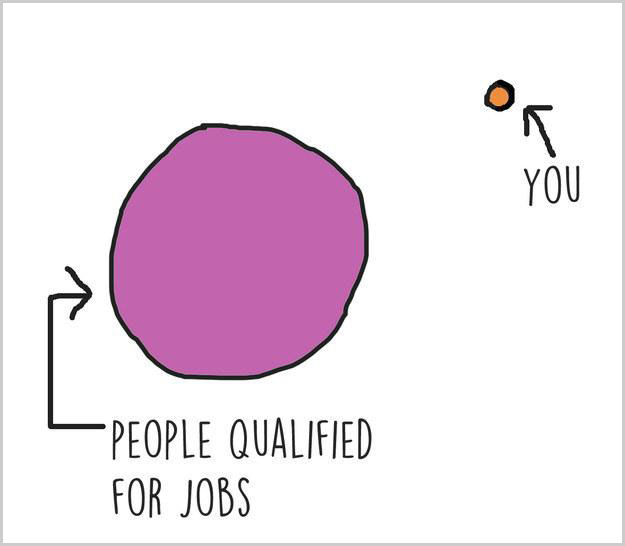
Let’s get one thing straight: imposter syndrome doesn’t discriminate. It doesn’t matter who you are or what you do, it can happen to anyone. It doesn’t matter if you’re a student, an employee or a manager. You can experience this psychosis. That persistent inner voice telling you that you’re faking it and that your achievements are the result of luck, not merit? It’s real.
What is imposter syndrome (also known as the imposter phenomenon or fraud syndrome)? In short, it is feeling like the imposter when you’re not, like you are a fraud on the verge of being revealed to the world. It is a sign that you apply exceptionally high standards to yourself that don’t correlate with how you view others. The fear of being “unmasked” stems mainly from people’s anxiety about revealing their true selves in private while others project a different image to the outside world, which is even more pronounced in the age of social media. Not only the fear of failure but also social comparisons and the desire to be perfect are symptoms of healthy ambition gone wrong – in other words, impostor syndrome.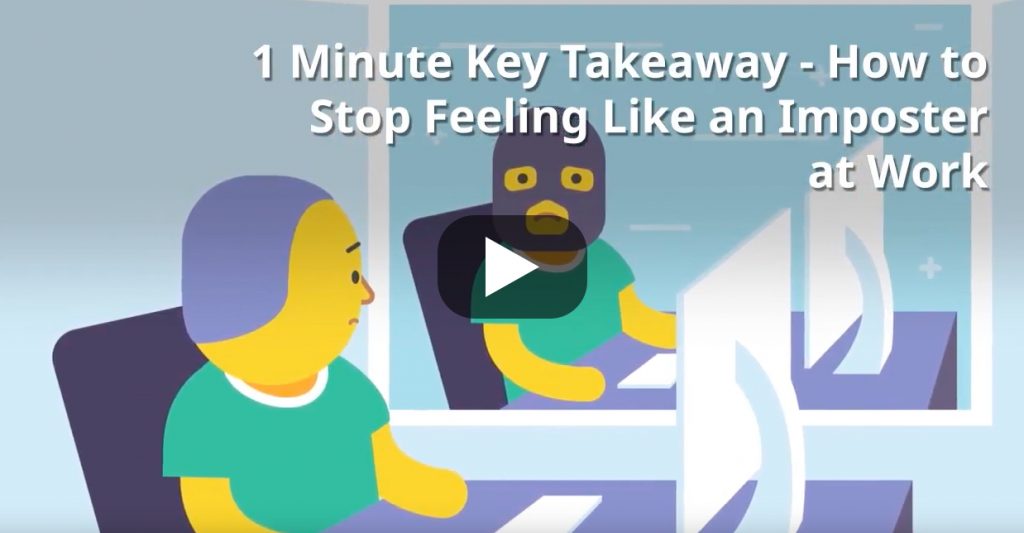
According to research, nearly 70% of people have felt like an imposter at some point in their lives. Imposter syndrome can lead to clinical levels of depression and anxiety. It’s important to remember that this isn’t just a short-term issue. These kinds of repercussions can have a long-lasting impact on our sense of self and effectiveness at work. Across the globe, many people suffer in silence, including Oscar winners, holders of Ph.D. degrees, and even company directors. They feel like they’re not as good as everyone else thinks they are. This internal battle is often neglected, making it hard for such individuals to seek help or even to speak about the issue.
The role of social media in imposter syndrome
Let’s face it: social media is a double-edged sword. On one side, it allows us to communicate with friends and family, stay informed, and express our creativity. However, it promotes imposter syndrome. Every swipe through Instagram, LinkedIn, or Facebook appears to display wonderful lifestyles, careers, and people. It’s as if the world is full of successful entrepreneurs, shining influencers, and corporate rockstars, while you’re just trying to get through the week.
When everyone else’s highlight reel is flashing before your eyes, it’s hard not to think, “Why do I feel like an imposter?” After all, they have their dream job, their dream body, and their dream vacation. You, on the other hand, have a pile of laundry and the vague hope that you’ll someday remember to make that dentist appointment. But that’s the beauty of the imposter syndrome social media style: it thrives on comparison. We compare our behind-the-scenes to everyone else’s best angles, meticulously edited for perfection. And surprise – we always lose that comparison.
The issue here is that social media gives us the illusion of a perfect world. It’s easy to forget that no one posts about the hard days or the countless hours spent behind the scenes. There’s no #BehindTheScenesOfSuccess hashtag. Instead, we see photos of people effortlessly crossing the finish line, and we can’t help but think, “Why can’t I do that?” The truth? They probably can’t either – at least not all the time.
Of course, the irony here is that while imposter syndrome feeds off comparisons, social media is the biggest culprit in turning us into perpetual comparers. We scroll, we compare, and we feel worse about ourselves. Repeat. Meanwhile, everyone’s out there pretending that their life is picture-perfect, posting about their promotion while you’re still waiting for the coffee machine at work to start functioning again. Social media isn’t just about the “look how great my life is” posts – it’s about shaping a narrative that we then internalize as the only narrative. Spoiler alert: it’s not.
So, what can we do about this? First and foremost, remember that social media is a highlight reel, not a documentary. If you’re reading through and feeling bad about yourself, it might be time to put your phone down for a moment. Take a step back and remember that the people you respect most likely struggled to reach where they are now. And while you’re doing it, celebrate your own triumphs, which are just as genuine as the filtered lives you see online.
A few more facts about imposter syndrome
As I said before, Clance, one of the first psychologists to identify imposter syndrome, defines it this way:
Most people who experience the Imposter Phenomenon (IP) would not say, “I feel like the imposter”. Even though they are often very successful by external standards, they feel their success has been due to some mysterious fluke or luck or great effort; they are afraid their achievements are due to “breaks” and not the result of their own ability and competence.
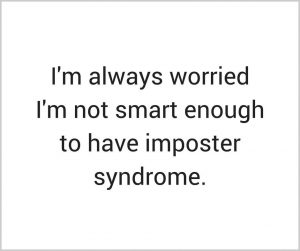
Joyce M. Roche, author of “The Empress Has No Clothes: Conquering Self-Doubt to Embrace Success,” describes imposter syndrome as:
Imposter syndrome is the fear and self-doubt that causes people to question their abilities — even in the face of success — and to constantly search for external validation. Simply put, it makes it difficult to recognize and celebrate one’s strengths and accomplishments.
What’s more, although the syndrome has touched approximately three-fourths of the world’s population, it often goes unrecognized. Those who suffer from imposter syndrome are extremely scared of failure, mistakes, and negative feedback from others. As a result, imposter syndrome can limit exploration and the courage to dig into new experiences.
The discouraging paradox is that getting better at your job doesn’t seem to make imposter syndrome disappear. The higher you climb up the corporate ladder, the more likely you are to become a victim of feeling like an imposter at work.
It should be mentioned that even though imposter syndrome is a popular research subject, there’s still a great deal of uncertainty about its causes.
Why do your colleagues (or maybe you) suffer from imposter syndrome?
To begin with, imposter syndrome is a problem partly caused by social media. Everyone hides their efforts but reveals their achievements there. People present themselves as successful brands on social media, an impression that often does not equate with reality. People sometimes forget this fact and compare themselves to these “brands.” It leads to unhealthy personal expectations. Since we all try to present ourselves as shining stars, the standards have risen extremely high.

Other researchers have noticed that imposter syndrome is related to the gig economy, where temporary jobs are commonplace and turnover is huge. We have thousands of career options. We exist in a highly competitive environment, and our professional environment is constantly reminding us that we should be the best. This can be damaging and confusing to our self-esteem and mental health.
Moreover, many fields of business, especially digital ones, are fast-paced and changeable. It is what makes business ownership and startups so interesting and challenging at the same time. That also means that you regularly have to deal with things you don’t know, and everyone tells you “you need to learn them ASAP.” The pace of technological change is faster than ever; it’s hard to stay on the cutting edge unless you can learn on the fly.
Similarly to social media and the gig economy, another contributor to the problem is overworking, writes Julie Bort in Business Insider. Some companies not only expect their workers to work 50- and 60-hour weeks but also tell them that “real specialists should love their work so much that they do it in their spare time too.” Sadly, these long work hours actually kill productivity and strengthen the effects of imposter syndrome.
To sum up, no one can be sure what the exact cause of imposter syndrome is, but ever-increasing social comparisons, the competitive nature of today’s professions and businesses, the pressures of perfection, and the fear of failure are all cited as contributing factors.
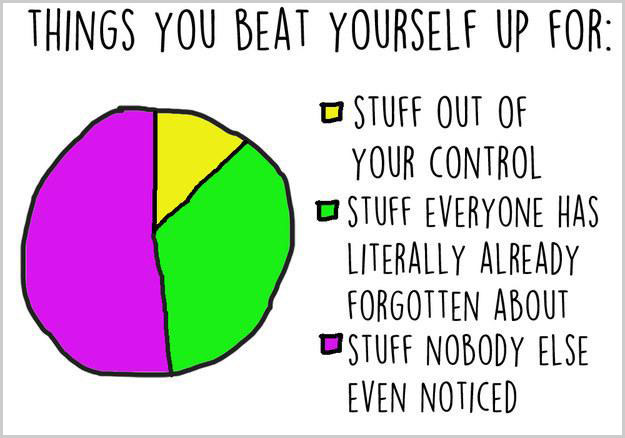
Downsides of having imposters in your startup or small business team
Imposter syndrome can result in thoughts like, “I don’t know what I’m doing, but I feel like I should do something, so I’m going to pretend I have it all figured out.” It can affect anyone, from CEOs to developers. Your business, whether it’s a startup, a small business, or a large enterprise, may experience serious consequences if you have a large number of people who are faking their way through the workday.
Imposter-led startups use different metrics to make themselves look better, and prioritize motion over progress, and their startups may suffer from vanity-driven decisions. Check out these three common symptoms of imposter syndrome in your team:
1. Poor crisis management
Imposter leaders spend more time solving problems than preventing them, and they tend to try to solve the same problem over and over again.
2. Decision-paralysis
To the imposter, there’s nothing more terrifying than making the wrong decision and being proven incompetent. He or she won’t make a decision until they have all the answers, which of course they never will.
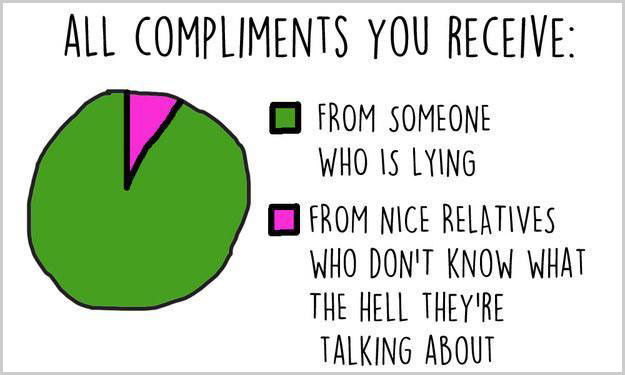
3. Denial of fear
Everyone’s afraid of something. But people who suffer from imposter syndrome are internally shaken with a fear of potential failure, even if they never outwardly show it. Their startup is failing? Not a possibility. Letting their team down? No chance. They’re 100% in control at all times. Or so they want you to think.
Any of those symptoms sound familiar? We’ve all been the imposter at some point in our lives. Of course, feeling like a fraud at work is not enjoyable. But what if we can find a silver lining to this self-doubt?
The good side of being an imposter
As it turns out, having imposter syndrome can actually be a good sign. How so? People with imposter syndrome tend to be perfectionists, which means they’re highly motivated and more likely to spend extra hours working to make sure they excel in every single field. So if you do suffer from imposter syndrome, chances are you’re doing a pretty good job 😉
How to overcome imposter syndrome?
Here are several practical exercises on how to overcome imposter syndrome.
1. Be sincere to yourself
It’s easy to tell yourself that your fear is down to imposter syndrome and then let it go. The first step to dealing with this is to identify it. The first step is to face the facts and admit that you have a problem. Our biology makes self-doubt a practical thing, and so is recognizing it in ourselves. It’s important to remember that everyone, at some point in their life, has experienced imposter syndrome. Even those who are successful can struggle with it. You’re not alone in this fight.
2. Share your fears
Imposter syndrome grows in isolation. So don’t hide your fears! If you’re afraid of something, there a good chance that others probably are too. Like you, they have been too afraid to say anything. Break the silence. Talk with trusted friends or professional colleagues. It would also help to find a mentor in your field who understands the details of your job.
The only person who expects you to have all the answers is yourself. Make room for collaboration. Your team probably knows you don’t have all the answers anyway, so stop pretending. You can’t work together effectively without full transparency.
3. Make decisions, even bad ones
The consequences of a bad decision are rarely worse than the consequences of indecision. The truth is, that most of your decisions will be wrong. And that is okay and natural because you will be able to make a better decision with the information you have after a failure. So get over yourself, make a decision, measure your productivity, and adjust properly.
Being wrong doesn’t make you a fraud. Nobody is perfect. Losing is just a part of the game.
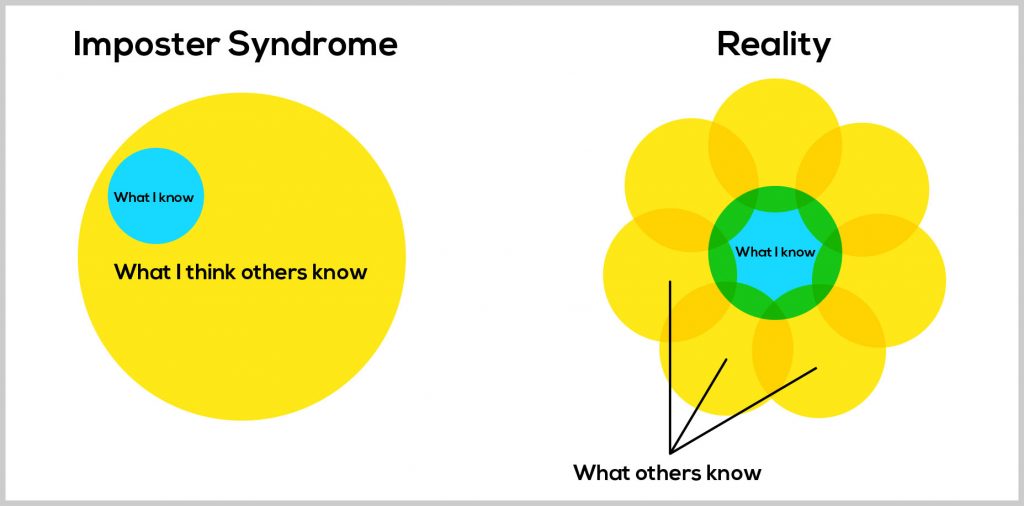
4. Stop comparing yourself to others
This is a must if you want to learn how to overcome imposter syndrome. If you look at other people’s Facebook or Instagram feeds, everyone seems to live bright and easy lives. But what you see there is a filtered look at reality. You don’t see failures on social media because those don’t get as many “likes.” We share what makes us look better.
You aren’t here to live the life of another person. Live your own life, not someone else’s. Don’t fall into the trap of letting others’ opinions dictate your actions. Shut down Facebook and Instagram and start to respect your own experience.
5. Accept your role in your successes
We feel like the imposters because we are unable to accept our successes. We were given an opportunity that others weren’t. And so nothing we’ve achieved after that opportunity was actually deserved.
Think about how long you could realistically dwell on these ideas. How did you seize that chance and make the most of it? But think of plenty of people who were given the same opportunities and didn’t make the most of them. As they say, luck favors the prepared. Let me put it this way: the outcome of your effort is always down to how much work you put in, your skills, and how well you time things.

6. Keep a file of people saying nice things about you
Every time someone writes you something good, take a screenshot and put it in your folder. When you feel like the imposter you can go look through the stories of people you have helped. Collect your wins, testimonials, or whatever, and then visit them when you are feeling like a fraud.
7. Admit that perfection doesn’t exist
It just doesn’t.
That’s it.
Which of the previous tips seem useful to you? Comment below 🙂
Be aware of the imposter syndrome
The world we live in is the result of a lot of brave people trying and failing—and only succeeding once in a while. You’re not an imposter for trying something that might not work out. You’re a hero.
Keep in mind that obstacles are frequently the catalysts for growth. Failure is a chance to grow and learn, not a sign of weakness. Your flaws are what make you stronger, therefore there’s no need to hide them.
Bit by bit, complete the tasks at hand; identify the issue, appreciate the little things, and don’t be scared to seek assistance. Taking proactive measures to better understand yourself and practice self-compassion will help you slowly shift your perspective from one of “I feel like an imposter” to one of “I am growing and learning.”



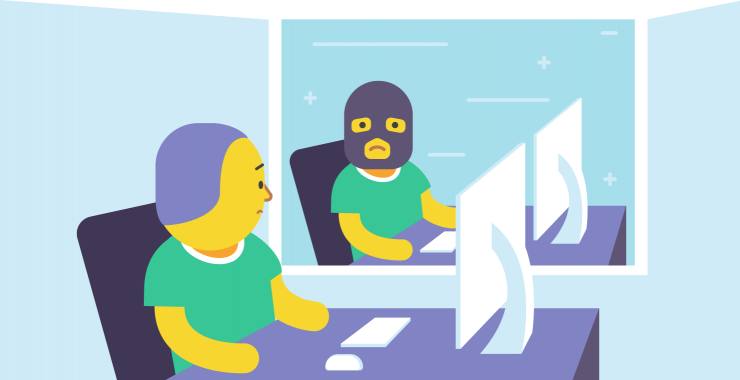





Add comment